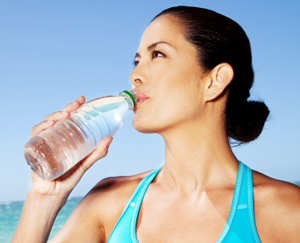- By Suzanne Dixon, MPH, MS, RD
Demystifying Detox Programs
Detoxification programs are based on the idea that the body functions poorly when harmful substances build up in the body. Proponents of detoxification attribute a wide range of symptoms, from fatigue and headaches to allergies, sinus problems, bloating, weight gain, and dull skin and hair, to toxin exposure and build up.
There is no official definition of what constitutes a detoxification program, but the general idea is to cleanse the body of damaging substances, which can include air and water pollutants, pesticides, herbicides, solvents, and other industrial and agricultural chemicals. Most programs recommend people also avoid alcohol caffeine, sugar, artificial sweeteners, and food additives.
There is no official definition, but the idea is to cleanse the body of damaging substances, including air and water pollutants, pesticides, herbicides, solvents, and other industrial and agricultural chemicals
What the advocates say
Many supporters of detoxification acknowledge the lack of scientific evidence behind the approach, but point out that people often report increased energy, clearheadedness, and a general feeling of well-being afterwards. When approached correctly, advocates claim a good detoxification program can jumpstart weight loss, identify food sensitivities, increase energy, and empower people to adopt healthier eating and lifestyle habits. Juicing programs where a person fasts but continues to drink nutrient-rich raw juices are thought to provide energy and help cleanse the colon and liver.
What the critics say
There is little or no scientific evidence to support claims that the approach improves health, and the symptoms for which detox programs are prescribed is so vague that it’s often impossible to know the cause or whether detoxification really is a cure. Further, some practices related to detoxification, such as colonics, may affect a person’s electrolyte balance, which has caused some doctors to warn against it. Another approach for detoxification, taking laxative herbs, has been reported to disturb healthy digestive tract bacteria needed for digestion and immunity, and cause loss of important minerals, such as sodium, potassium, and magnesium.
Detox dos and don'ts
If used with care, detoxification programs may help you feel better and get health habits back on track. Many of the safest practices simply involve eating foods that are well-known to support a healthy digestive system and colon, or to stimulate bile production (a sign your liver is working well) in everyone. Use the following tips to decide if and when detoxification is right for you.
- Consult a professional. Talk to your doctor before you add any dietary supplements to your self-care plan. This is especially important if you have chronic conditions such as heart disease, high blood pressure, or diabetes.
- Avoid aggressive approaches. Do your research and talk with experienced, reputable practitioners before considering more aggressive detoxification practices, such as colonics and the use of strong laxative products, as these practices are associated with potential side effects.
- Weed out offenders. Many detox diets advise that you cut out caffeine, alcohol, white sugar and flour, artificial sweeteners and all processed foods. We all would do well to follow this advice.
- Conquer caffeine. A complete ban on caffeine can lead to withdrawal symptoms, including nasty headaches. Instead of going cold turkey, slowly decrease caffeine intake in the lead-up to your full detoxification program.
- Be a label reader. If you try detoxification products, read the label carefully and follow all instructions. Taking more than the recommended dose may cause unpleasant and potentially harmful side effects.
- Note ingredients. Any detox product that contains laxative ingredients such as senna, slippery elm, or psyllium will move waste more quickly through your colon and out of the body. These products also may remove medications, and if a medication passes through too quickly, it may not work as intended.
- Focus on food. To get the most of any detox product, clean up your diet, too. Fresh vegetables and fruit should cover two-thirds of your plate. Include cruciferous vegetables, such as broccoli, cauliflower, cabbage, Brussels sprouts, kale, chard, kohlrabi, bok choy, collard greens, turnips, rutabaga, mustard greens, radishes, and watercress, which contain nutrients that bolster the liver’s ability to detoxify chemicals.
- Drink up. You’ll need fluids to digest the extra fiber you may be eating. If your urine is pale yellow or straw-colored, you’re getting enough water. Any darker than this and you need to drink more.















